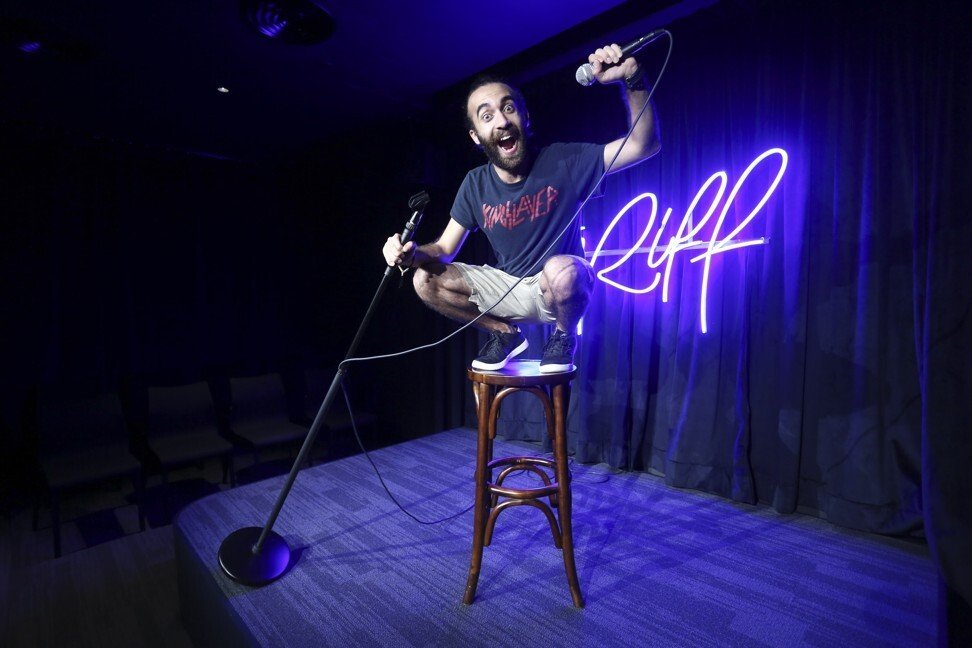
Why Hong Kong’s stand-up comedy scene is no laughing matter
“So that’s the colour of adrenaline,” I concluded after my third trip to the urinal in an hour. “Maybe I should use that line in my routine?”
These are the thoughts that were running through my mind shortly before my stand-up comedy debut. At such moments, all that matters is being funny. And not pissing yourself. And being funny on a stage. And not pissing yourself on stage. For an unbroken stream of several minutes. In front of an actual audience.
Far from years of honing this sacred stagecraft in front of a bathroom mirror, hairbrush microphone in hand, that night’s bladder betrayals belied three – to be fair, three in-depth – stand-up comedy classes stewarded by regional veterans Andy Curtain, Vivek Mahbubani and Ben Quinlan, and held over three consecutive weeks at Hong Kong’s only full-time comedy club. In classic comedy style, The Riff opened its doors in California Tower, Lan Kwai Fong, in January, just before the coronavirus booed the whole citizenry off stage.
And before the virus, a year of protests, arrests and tear gas. If there were ever a right time to visit a comedy club, this was it. I was determined, whatever the viral fates had in store, that they would not intervene before I had thoroughly embarrassed myself in public.
I emerged from the restroom, uttered a few expletives and bounded on stage to drop my comedic gauntlet: “I was going to start by telling you all a joke about coronavirus. But you’d have to wait two weeks to see if you got it – and tonight I only have five minutes.”
People laughed. There was hope. I was going to be the next, well … the next famous comedian not to be accused of some lurid sexual impropriety. If nothing else, I would survive my first-ever set. I would have taken that all important, bladder-shattering first step.
Curtain, the head of Live Nation Comedy Asia and general manager of The Riff, first caught the stand-up bug after watching Eddie Murphy’s legendary 1983 show, Delirious, hoping one day to make people laugh just as hard. But the comedian from Melbourne, Australia, only plucked up the courage when he moved to Shanghai, in 2010.
Ten years on, the 36-year-old is a seasoned performer on Asia’s stand-up circuit and his advice for rookies like me is simple: “Don’t take it too seriously. Don’t overthink it. If you wanted to take up painting, you wouldn’t expect your first work to be hung in an art gallery, but people have this idea about stand-up that they won’t do it unless it’s going to be great. Being humiliated on stage is not necessarily a bad thing. It gives you more humility. It’s all in your head and how you react to it. Embrace the whole process and enjoy it.”
As Curtain had said in his class on structuring content, a comedian’s act is like “a bag full of diamonds and coal”. When you are writing, you are looking for a piece to polish, but still holding on to most of what you have for the future.
“One of the greatest stand-ups of all time, Steve Martin, said that you’ll end up using every joke you’ve ever written. Even if they’re not ready yet, you’ll use them some day when you’re a better comedian,” said Curtain. “The three classes are just there to give you enough confidence to go through with it. To stop worrying about how you’ll look in front of a bunch of people at an open mic who aren’t even prepared to pay to see the show!”
No doubt the three lessons did help, and attending a few open mics beforehand helped even more, if only because some of the acts made me think, “Well, at least I can’t be worse than that!”
Mahbubani, 38, is a Hong Kong-raised bilingual stand-up comedian who performs in English and Cantonese and has several regional comedy awards under his belt. In his stand-up class on structuring content, he quoted American comedy star Carol Burnett’s famous line, “Comedy is tragedy plus time.”

“Dreadful experiences can often be the basis of funny jokes or stories,” Mahbubani told us. “Sometimes it’s just a starting point, but it’s something you can develop and put a twist on. Always try to add value and take it further.”
Mohammed Magdi, 30, The Riff’s comedy-room manager and a seasoned performer, has opened for globally known comics such as Jim Gaffigan and Gad Elmaleh on their Asian tours. Magdi’s one piece of advice for a stand-up debut? Don’t invite your friends.
Magdi treats humour as something you have to keep working on to get better. He admits that in the beginning he didn’t have much of a comedy muscle and needed to exercise it to beef it up. The Egyptian comedian made his debut in 2013 and says he leaned on an Arabic proverb to get him through his first stab.
“Loosely translated, ‘If you are in a place where no one knows you, get naked and run around the street.’ No one knew me, so what was the worst thing that could happen? If I sucked at it, it didn’t matter. Now I’m obsessed with stand-up and I’m always working on getting to what’s funny in any situation.”
Readers and audiences will be relieved to hear that my clothes stayed firmly on during my set, although at one point, when I was talking about being so overweight that “I went for a swim in Loch Ness and the monster had to get out”, being naked might have helped to illustrate the magnitude of the situation.

The joke belly-flopped – thank you, thank you – but it did provide a much needed lesson in another rule of comedy: that timing is everything. This harked back to Quinlan’s class on mastering delivery. Quinlan has opened for big hitters such as Russell Howard, Kevin Bridges and Doug Stanhope, and by day he runs a strategic consultancy business in Hong Kong and is a keynote presenter in the financial services industry.
“I always had confidence and was a good public speaker, but nothing prepares you for doing stand-up,” the 37-year-old had told us. “It’s terrifying, but if you can get your timing right it’s a huge help starting out. Delivery is the most important thing, not the joke. Remember to pause and take a breath – one of the biggest mistakes is to talk too quickly. Body language is also important. The more at ease you are, the more your audience will be, so come out smiling.”
There might well have been more grimacing than smiling from me during my set. But after a supportive round of applause and having returned to my seat, a feeling of relief and satisfaction morphed into a sense of pride. “Good work, me, it takes courage to get up there.”
And I began to understand the courage it must take to leave the security of a good job behind and choose stand-up as a career.
In 2010, Curtain was living in Shanghai and working in finance. Increasingly unhappy in his job, he had always wanted to try stand-up, but it didn’t really exist in the city at that time.

“Once or twice a year, The Punchline Comedy Club would bring in British comedians who would perform in a local British pub for British audiences but there was nothing local,” Curtain explains. “I eventually did an open mic and didn’t know what I was doing. I wrote a lot of jokes about the Expo that opened in Shanghai that year. But it wasn’t a tough transition to make. If you lived in China then you could do anything and completely reinvent yourself.”
In Shanghai back then, the crowds were forgiving and sympathetic, just happy to see you give it a go.
“It may have been comedy with kid gloves in Shanghai when I first started, but it showed new comedians can have a real shot at doing well and developing,” says Curtain. “Then when you have a good host and good comedians in the line-up, it gives the show lots of momentum.”
By 2011, Curtain had quit his job to organise comedy nights as well as performing and fostering new talent. He began the Kung Fu Komedy Club, which pioneered Shanghai’s stand-up scene, bringing in scores of international acts and creating a platform for China-based comedians to find their voice.
But it was when Curtain imported British A-list comedian Eddie Izzard in 2017 that people really began to take notice, not least Live Nation, the biggest comedy promoter in the region. The entertainment house behind the legendary Punchline Comedy Clubs in the United States is home to the likes of Dave Chappelle, and brought stand-up greats such as Jim Jefferies and Russell Peters to Hong Kong.
Curtain has come a long way in a relatively short time, and changing his profession has changed his life. The Australian had a huge 2019, touring Asia with Gaffigan, Jefferies, and even bigger acts such as Chappelle and Kevin Hart.
“In that weird environment where you feel you can do anything, many people have thrived,” he says. “I probably never would have got up to do an open mic in Melbourne. It was easier in Shanghai, as the fish-out-of-water viewpoint is always funny. The expats or outsiders there can relate to it and the insiders can see the place where they live in a new light.”
Curtain realised expats trying stand-up in Asia had nothing to lose, and “Hong Kong is ready to laugh. It’s been a tough time. When Lan Kwai Fong was closed down, the one business doing well here was the meditation clinic. Comedy can help in the same way. There’s nothing more therapeutic than having a really good laugh.”
He says he wants to develop local talent, breed healthy competition and put pressure on stand-ups to do well. And you’ll know exactly how good your routine is when he greets you after a set.
If you have done well, he says, “Good set!” If your routine still needs work, he says, “Good job!” After my stand-up debut, he says, “Good job!”
I guess I’m not ready for that career change just yet.
… And that was supposed to be where this story ended. A nice little piece of self-deprecation to earn me some street cred. But then the coronavirus returned to Hong Kong for a third wave. The Riff had to close and weather the storm. This article was put on hold until the stand-up venue reopened.
One month became two months. Then when Covid-19 restrictions started to ease, Curtain revealed that the virus had claimed another victim – The Riff would not reopen, and he and his staff had been laid off.
The writing was on the wall when Live Nation reported grim second-quarter results, with revenue of US$74 million, down 98 per cent from US$3.2 billion in the same period a year earlier, after steep losses as income from concerts, sponsorships and ticketing dried up. What should have been the busiest time of year for the entertainment giant was a washout.
Talk about a bad joke.
When Curtain got the call to inform him that The Riff would be closed for good and he and his colleagues were out of a job, it did not come as a big surprise. “I knew that things were not looking good, but I still hoped we’d survive,” he says. “Sadly, it wasn’t to be.”
Never a quitter, Curtain has worked out a deal to stage stand-up shows at The Riff’s venue from time to time – there is one planned for December 5, coronavirus permitting – but he is not too worried about finding a permanent home.
“The Riff was a great venue, but at the end of the day, no one goes home after a comedy night and says, ‘The comedians were crap, but it was a lovely venue.’ It’s about the comedians, not the room they’re performing in. We have good comedians in this city, that’s all that matters,” he says.
“What The Riff showed in the few months it was open was that the Hong Kong stand-up scene is phenomenal. We put on some top-quality shows and to me, that’s the most important thing. Finding another room for people to do stand-up in is relatively easy.
“What’s essential is having a great scene of committed and funny comics and we’ve shown Hong Kong has that. We will find another home for them all.”










